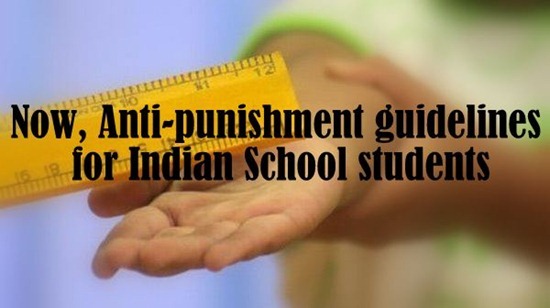I am sure most of you must have read news one time or the other about the brutal punishments meted out to students in many schools in India. In my personal opinion, this is one of the worst ways to discipline a child. In most western countries, there are extremely stringent laws against any physical punishment given to students. However, in India it is commonplace to beat students up in school.
Taking note of many recent incidents of students being grievously harmed, Indian Government has come out with anti-punishment guidelines much to the relief of millions of Indian students.

The guidelines state formation of special monitoring cells that will take action against Teacher / School in cases of physical punishment meted out to students. Teachers will have to sign undertakings against physical punishments and social audits of schools will be conducted in areas of corporal punishment.
These “guidelines for eliminating corporal punishment in schools” was formulated based on detailed study which was conducted in 2009-10 involving 6,632 children across seven states in India. The NCPCR survey revealed that the use of physical punishments was rampant in Indian schools and cane beating by teachers was a common practice.
Like I mentioned earlier, I am glad Govt. has taken steps to curb the torturous punishments given to children – It was a must. However, it is also important that parents and students do not take undue advantage of this – It is very much possible that teacher may be persecuted for every act of discipline or probably even based on false reports by students of teachers. This should not happen. There has to be balance, otherwise these guidelines may actually prove counter productive!
Would love to hear your views on this!

well! When i was in school corporal punishment was abducted. Still i get news about physical and mental torcher that very eminently prevails in schools. So who basically moniters these activities? And is it anyways possible to keep an eye on some 50 thousand small and big schools everyday?
Finally, Indian Govt. releases anti-punishment guidelines for School students http://t.co/UpOnJMjc
Finally, Indian Govt. releases anti-punishment guidelines for School students http://t.co/MOGHPf10
Finally, Indian Govt. releases anti-punishment guidelines for School students http://t.co/APHX4UF1